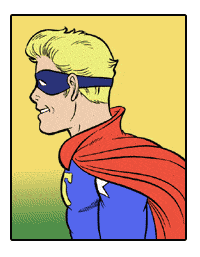
(originally published in the July, 1976 issue of Once Upon A Dime)
In part one of this article, Donald set the stage for an incredible example of editorial crumbling. After over a decade as an example to boys everywhere, Liberty Lad was about to face the one enemy few have been able to withstand: censorship.
As figures of wish-fulfilling inspiration, superheroes should have been invulnerable to the psychologist’s stare. Dr. Wertham slid innuendo towards them. Specifically, he cited Bruce Wayne and Dick Grayson’s relationship as a “homosexual dream.” And of course, generally, that tarred an entire genre.
It didn’t help that within the industry, some jokes had been made about guys like Sam Clay, who did seem to create an awful lot of boy sidekicks the moment he’d inherit a feature. McNeal almost certainly would have been among those making remarks, arching his eyebrows and lifting his pinky in jest. Talk to many old-timers now, and they’ll still express regret over the “ribbing” they gave Clay in particular, ribbing that was none too subtle and eventually, none too contained when the government came sniffing around.
In 1954, public reaction to some of comics’ more lurid contents had grown to the point that the politicians had to get involved. As part of the function of the Subcommittee To Investigate Juvenile Delinquency, the U.S. Senate held public hearings in New York in the Spring.
Publishers grew nervous, especially when it became clear that the Subcommittee considered comic books “…to be neither humorous nor books,” as their interim report would say. Though both Chairman Senator Robert C. Hendrickson, N.J., and later Chairman Senator Estes Kefauver, Tennessee, would claim that censorship was not their goal, certainly the public would demand something very much like it.
It is not my purpose here to rehash the better-known consequences of these hearings and the subsequent report, how the industry offered up EC Comics as a sacrificial lamb. Others have covered that ad nauseum.
No, my corner of history is a little dustier, but no less shameful for its victory over good clean fun. When rumor reached McNeal that writers and editors were to be subpoenaed to testify before the Subcommittee, he panicked. Any book of dubious substance was immediately cut from production.
Gone were Those Glorious Gangsters, Teen Tomboy, Flesh Eaters, DOPE! and Bloodcurdling Tales For Children. When McNeal had run out of iffy titles, his still fearful eye turned toward the remaining characters in his stable.
No one would accuse Amazing Comics of being less than rugged and confidently heterosexual, at least not while McNeal was in charge.
Immediately, Commander Courage’s longstanding platonic relationship with Guidance Counselor Joan Danfield heated up into something chaste and child-friendly but no less fiery for all that. Within months of the Subcommittee Report, the ill-conceived superhero romance comic Courage To Love would be born.
All funny animals in Barnyard Jamboree had to be depicted only from the waist up. If that was unavoidable, then trousers were required, even on Shecky Serpent.
And finally…Dusty Dale, Liberty Lad. He’d run barelegged through his adventures since 1942, and McNeal declared that he needed to dress less shamefully, so that it would be clear to readers that Commander Courage and Liberty Lad were fellow crimefighters and nothing more. (The recurring but not particularly popular school nerd character Milton Swishwell disappeared forever from the strip at this time, too.)
Artists on the strip argued with McNeal that Liberty Lad’s uniform simply echoed those of circus performers, and nobody thought that there was anything wrong with life under the big top. Allegedly, McNeal retorted “Not yet, anyway,” before slamming his office door.
Times were tough for comics, regardless of the heat of censorship. Even without Kefauver, several companies would have folded anyway. The giant imprint Fawcett quietly withdrew from the field entirely while still maintaining its other publishing interests. And so comic book creators could not well afford to stand on their principles.
With the January 1955 issue of Commander Courage Comics, Liberty Lad wore long pants. And an industry had lost its innocence.
Ironically, the final Subcommittee Report completely glossed over superheroes, focusing instead, as promised, on horror and so-called true crime. But the damage was done.
McNeal edited the Amazing Comics line for another decade before retiring. When interviewed in 1967 for Alter Ego, he expressed no regret for his shameful role in the history of a classic character. “They were just comics,” the bitter septugenarian complained, “get over it already.”
We are over it, Mr. McNeal; we’re just not willing to forget.
(Once Upon a Dime was a website created in 2003 to tie-in with Mark Hamill’s directorial debut, [amazon text=Comic Book the Movie&asin=B00606HJX4]. Though written by Derek McCaw, this article was originally attributed to Donald Swan, Hamill’s character in the movie. All artwork by Mark Teague.)




